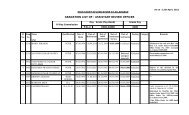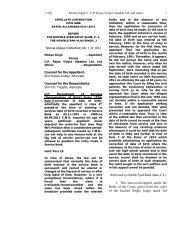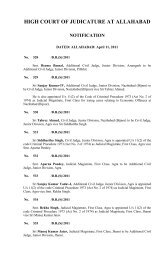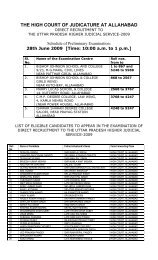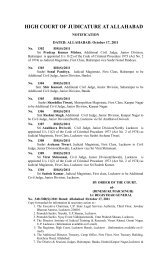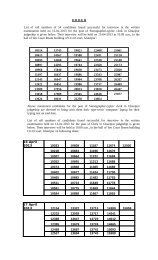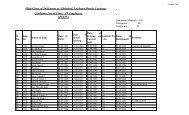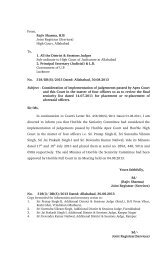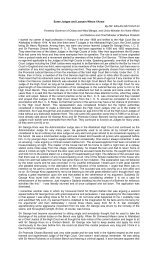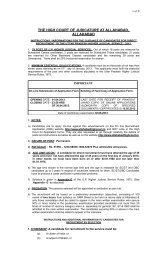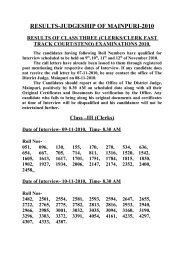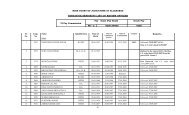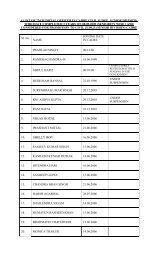Nov - High Court of Judicature at Allahabad
Nov - High Court of Judicature at Allahabad
Nov - High Court of Judicature at Allahabad
Create successful ePaper yourself
Turn your PDF publications into a flip-book with our unique Google optimized e-Paper software.
3 All] Naik R.K. Mahap<strong>at</strong>ra V. Chief <strong>of</strong> Army Staff and others 1021<br />
concerned has given adequ<strong>at</strong>e opportunity<br />
<strong>of</strong> placing his defence in accordance with<br />
rules and procedure provided, therefore, it<br />
cannot be held th<strong>at</strong> punishment awarded<br />
is not correct and proper.<br />
9. I have considered the submissions<br />
made on behalf <strong>of</strong> parties. From the<br />
record, it is clear th<strong>at</strong> earlier petitioner has<br />
been awarded four red ink entries under<br />
various sections <strong>of</strong> the Army Act and he<br />
was punished for the same and it was<br />
incorpor<strong>at</strong>ed in his service record.<br />
(a) Army Act Section 40 (C) on 16 Oct<br />
8914 days RI, by Lt.Col N.C.Dutta<br />
(b) Army Act Section 39 (d) on 30 Mar<br />
96- severe Reprimand by Lt.Col Surjit<br />
Singh.<br />
(c) Army Act Section 63 on 16 Sep 96-<br />
Severe Reprimand by Col Kamal Mohey.<br />
(d) Army Act Section 63 on 02 Apr 96-<br />
Severe Reprimand by Col JS Dhillon.<br />
(e) Army Act Section 30 (a) on 18 Mar<br />
2000- Severe Reprimand by Major J.S.<br />
Shekhaw<strong>at</strong>.<br />
10. Lastly, petitioner was awarded<br />
Severe Reprimand under Section 39(A)<br />
on 18th March, 2000. The argument<br />
raised on behalf <strong>of</strong> petitioner to this effect<br />
th<strong>at</strong> if some punishment is to be awarded<br />
to petitioner, there was no occasion for<br />
initi<strong>at</strong>ing an administr<strong>at</strong>ive action against<br />
petitioner Under Rule 13 (3)(iv) <strong>of</strong> the<br />
Army Rules. It was incumbent on the part<br />
<strong>of</strong> respondents to have an enquiry to hold<br />
a trial for the purposes <strong>of</strong> initi<strong>at</strong>ions<br />
action against petitioner. Rule 13 gives<br />
the power to the Sub Area Commander<br />
ordering discharge in the circumstances <strong>of</strong><br />
the case permit to give the person whose<br />
discharge is contempl<strong>at</strong>ed, an opportunity<br />
to show cause against the contempl<strong>at</strong>ed<br />
discharge is to be given. From the perusal<br />
<strong>of</strong> aforesaid rule, it is clear th<strong>at</strong> power has<br />
been conferred to army authorities to take<br />
administr<strong>at</strong>ive action against a person<br />
who is serving in the army. From the<br />
record it is clear th<strong>at</strong> petitioner was<br />
habitual <strong>of</strong>fender and earlier he was<br />
punished four times under various section<br />
<strong>of</strong> the army. The contention regarding th<strong>at</strong><br />
no administr<strong>at</strong>ive action should have been<br />
taken against petitioner as no <strong>Court</strong><br />
Martial has been held, therefore,<br />
punishment is bad in law and cannot be<br />
accepted in view <strong>of</strong> provision <strong>of</strong> Section<br />
125 <strong>of</strong> the Act. It is the army authority to<br />
choose the forum. Under the Army Act,<br />
there are two modes <strong>of</strong> punishment which<br />
can be awarded to a army person, one by<br />
a <strong>Court</strong> Martial and another is<br />
administr<strong>at</strong>ive action provided under<br />
Army Act and procedure provided under<br />
Rule 13 <strong>of</strong> the Rules. The decision citied<br />
by learned counsel for petitioner is not<br />
applicable to the present case as in<br />
Chaukas Ram's Case (Supra), it was not a<br />
case <strong>of</strong> red-ink entry. In the aforesaid<br />
case, petitioner was involved in a crime<br />
and has concealed the said fact. The other<br />
two cases relied upon by learned counsel<br />
for petitioners rel<strong>at</strong>es to the decision <strong>of</strong><br />
the st<strong>at</strong>utory complaint. This <strong>Court</strong> in th<strong>at</strong><br />
circumstances has directed the army<br />
authorities to pass appropri<strong>at</strong>e orders to<br />
decide the st<strong>at</strong>utory complaint. The<br />
submission <strong>of</strong> the learned counsel for<br />
petitioner to this effect th<strong>at</strong> punishment<br />
awarded to petitioner is very harsh. In my<br />
opinion, case in hand is a case <strong>of</strong> military<br />
personnel and discipline in the military<br />
service has to be maintained for the<br />
purposes and security <strong>of</strong> the country. In<br />
the case <strong>of</strong> Vidya Prakash Vs. Union <strong>of</strong><br />
India reported in AIR 1988 Supreme<br />
<strong>Court</strong>, 705, question raised before the<br />
Apex <strong>Court</strong> was in order to withdrawing<br />
red-ink entries and if a person is absent



